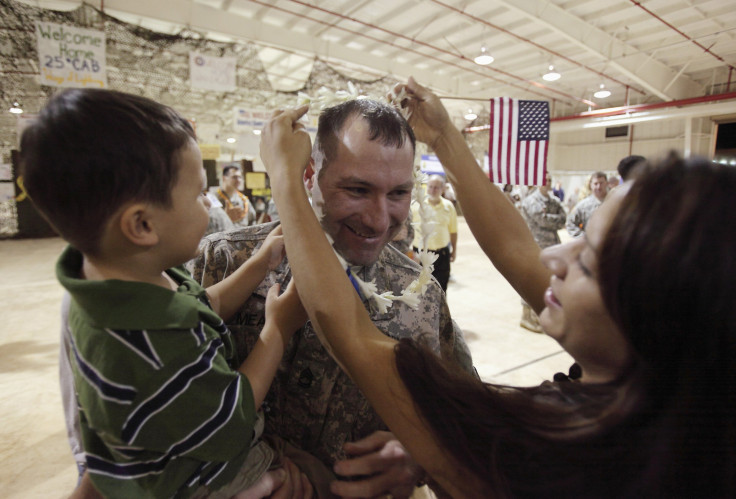'Support Our Troops' Includes Family Services: Children Of Deployed Parents More Accident-Prone

Since 2001, more than two million military children have been separated from a parent in the United States military due to combat deployments. Now, a new study from researchers at the Uniformed Services University of the Health Sciences suggests the impact of separation — and reunification — deeply affects these daughters and sons. Young children of deployed military parents, when compared to kids whose military parents remained at home, more frequently visited medical providers for injuries, mental health problems, and maltreatment. Sadly, an even higher risk of harm impacted those children who were reunited with a combat-injured parent.
Being part of a family is life's greatest joy, as most of us are blessed to know, yet it also requires effort and practice. So what happens when a parent dramatically leaves to fight a war? Throughout the years of military involvement in Afghanistan and Iraq, many American military families “have experienced at least one deployment, and many have undergone multiple, involving three, four, or even five or more family separations and reunifications,” wrote Dr. Stephen J. Cozza in an accompanying editorial. “Others have struggled with combat-related psychiatric disorders, such as post-traumatic stress disorder (PTSD) and physical injuries, including traumatic brain injury (TBI), which can affect children and families for years.”
For this study, a group of researchers led by Dr. Elizabeth Hisle-Gorman, gathered data from the U.S. Military Health System in order to analyze utilization patterns for 487,460 children between the ages of 3 and 8. The team calculated the number of times children of parents who deployed saw a doctor about a mental health issue, injury, or maltreatment. Next, the researchers calculated the same for kids whose parents deployed and returned injured and then for children whose parents never deployed.
Of the children studied, 12 percent (58,479) had a parent deploy, while one percent (5,405) had a parent injured during deployment.
Children of deployed and combat-injured parents had 1.09 and 1.67, respectively, additional visits for a mental health diagnosis; 1.07 and 1.24, respectively, for an injury; and 1.21 and 2.30, respectively, for maltreatment, when compared to kids whose parents did not deploy.
The researchers call for increased preventive services and interventions as parents return from deployments. They also noted in their conclusion, “child health and mental health providers are crucial to effective identification of these at-risk children.”
In a previous study documented in Social Work Today, teens and older children reported difficulties adjusting to a deployed parent’s absence, noting in particular the increased responsibility and stress. After the parent returned from combat, these same teens reported challenges with getting to know their parent again. Whether a break in the family structure occurs temporarily or permanently, children feel it deeply.
Source: Hisle-Gorman E, Harrington D, Nylund CM, et al. Impact of Parents’ Wartime Military Deployment and Injury on Young Children’s Safety and Mental Health. Journal of the American Academy of Child & Adolescent Psychiatry. 2015.
Published by Medicaldaily.com



























